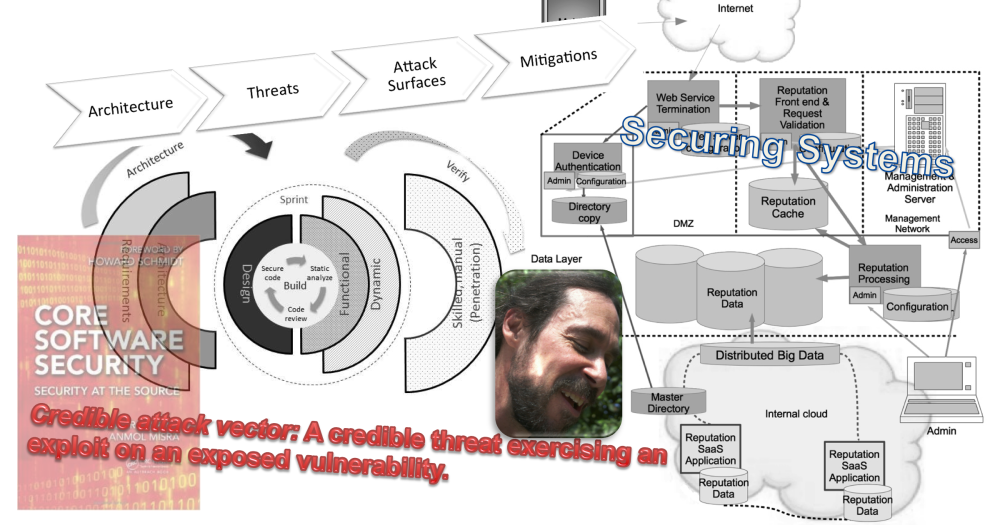Architect Surprise!
“Architect Surprise” is what I had last Thursday.
No, it’s not a new recipe. Nor is it a building whose structure is shocking. Although most certainly I was surprised enough to sit up and take notice.
I had been attending a series of security meetings where we agonize over the information security issues that are most on our minds.
I’ve been working with this group for 3-4 years. I find baring my security soul to peers and betters deeply helps my practice. And, if I’ve learned something, I’m happy to share any tidbits that I’ve gleaned so that we don’t all make my mistakes. Information security is just plain hard! (my 2 cents)
I can’t tell you who attends these meetings or who runs them.
Still, the facilitators are amazing professionals who work to help us enlighten each other. Let’s just say that it’s the CISOs (Chief Information Security Officers) or their direct reports for a lot of companies you’ve heard of and a few that maybe you haven’t – but they’re all at enterprise level. We have a strict “what is said in the room stays in the room” policy. And I intend to fully honor both the letter and spirit of that agreement.
I’m often the lone techie in the room. I’m not at all sure why these folks tolerate me? But they have been wonderfully open to me, and I deeply appreciate both their confidence, their help and in many cases, the friendship that has been given to me.
Thursday, we had a panel on “generation Y” in the workplace. An erudite and articulate group of folks was assembled to answer our questions. (Most of the usual attendees of the meetings are at least older than Gen-X, smile)
My architect surprise happened almost at the beginning. 2 of these folks, one of whom has been in the workplace for 3-4 years and another person that she recently helped to hire are “Solutions Architects” at a big insurance company.
Wow! At the company for whom I work, “Solutions Architect” is almost as high as one can go. technically.
So, I thought, maybe they’re just using this term in a really different way that I’m used to? I let it go and got on with the panel.
Then, later, it became clear that indeed, they probably did use the term “systems architect” as I know it. I don’t know what they mean by “solutions” and expect that there is some semantic difference?
However, even having someone straight from school (Masters, EE) fulfuill the role of architect I think is generally not a good idea.
I want to be clear that my worry has nothing to do with age, though level of experience is very key.
And here is why: I have long preached that systems architecture practice really requires someone to be deep in at least 2 technical areas. When I write “deep” I don’t mean “studied in school” or “majored” or “masters degree”.
I mean, “practiced successfully”. I mean, deep, as in, understands an area fully to a core level of practice and broadly across most common cases.
And, I’m sorry, young readers – that kind of experience is very hard to get without a practicum. It takes years. I don’t think it’s easy to short-cut the process.
Not that there can’t exist the odd talent who gets deep early and quickly. The extraordinary does manifest.
But most of us mortals have to live and work to gain our depth.
Why at least two areas?
Because I have seen that something magical and unexpected happens after the second deepening. Even more so on the third, the fourth. Besides, with each area, the next gets easier and faster.
It is the ability to identify and make use of patterns. And patterns are the basis for systems architecture. Not rules. Not following guidelines (architects create these from use patterns) Patterns. Design patterns. Data flow patterns. Communications patterns. Security control patterns.
I have watched great engineers founder as architects. Not everyone is cut out for noting and using abstract patterns, for identifying and working through the relationships between system components.(but that’s a different post)
Systems architecture isn’t about code modules and interfaces. Although that is wonderful place to build (and deepen) design skills. It’s the “school of hard knocks” where I did a great deal of my learning. But systems architecture steps above that to a greater level of abstraction (and sometimes to a much greater level of complexity).
No, I wouldn’t push my fresh-out-of-school recruits into an architect position. It’s not fair to them. And it’s not fair to the practice.
One of the panelists was delighted to have been given the chance to be an architect straight out of school. But I think she’s missing something important – her practicum that will set her free to design well, perhaps even innovatively.
I believe that systems architecture requires breadth and depth. This can only be won through time, successes, and the all important mistakes and missteps.
cheers
/brook
